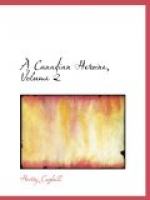“But why are you so late?” was the next question.
“I will tell you all presently. Pay the man, dear, and let him go. Or stay, tell him to come for me at ten o’clock to-morrow morning.”
Mrs. Costello was sitting by the fire when Lucia came back from her errand. She looked excessively pale and tired, but in her face and in that of Mr. Strafford as he stood opposite to her there was a light and flicker of strong excitement. Both turned to Lucia, and Mrs. Costello held out her hand.
Lucia came forward, and seeing something she could not understand, knelt down by her mother’s knee and said, “What is it?”
“Good news, darling, good news at last!” Mrs. Costello tried to speak calmly, but her voice shook with this unaccustomed agitation of joy. “He is innocent!” she cried, and covered her face with her hands.
CHAPTER XIV.
It was long before the one single fact of Christian’s innocence—proved, unquestionable innocence—had become sufficiently real and familiar for the mother and daughter to hear or to tell how the truth had come to light, and the justice of Heaven been swifter and surer than that of man. But at length all that Mrs. Costello knew was told; and in the deep joy and thankfulness with which they saw that horrible stain of murder wiped out, they were ready to forget even more completely than before, all the disgrace which still clung to the miserable prisoner, and to welcome him on his release with no forced kindness.
“On his release? Ought he not to be with them now?”
Lucia asked the question.
“He does not yet even know all,” Mrs. Costello answered. “He is so excessively weak that they dared not tell him till to-morrow.”
“To-morrow, then, he will be here?”
“No, that is impossible. There is much to be done first; but very soon I hope.”
Yet both doubted in their hearts whether the shadow—ever deepening—of approaching death could yet be so checked as to suffer the prisoner to breathe the free air for which he pined.
Meanwhile, the story was being told by every fireside in Cacouna with more of wonder and of comment than by that one where it had the deepest interest. And it was a tale that would be remembered and repeated for years, though no living man could tell it all.
That morning Clarkson had been for some hours at Cacouna. He had various places to go to, and both sales and purchases to make, but he found time, as usual, to visit more than one place where whisky was sold; and when at last he drove out of the town, he had but just enough power of self-control to keep himself from swaying about visibly as he sat in his sleigh. He was in boisterous spirits, and greeted every acquaintance he met with some rough jest—pointless but noisy—singing snatches of songs, and flourishing his whip with an air of tipsy bravado. At a small tavern near the sawmill he dismounted for the last time.




